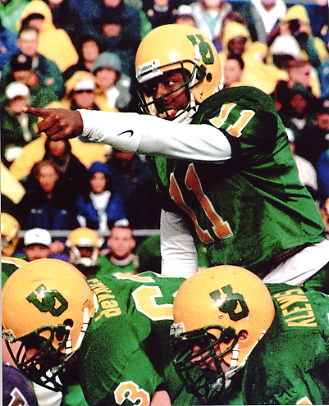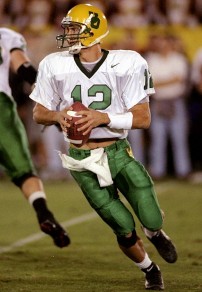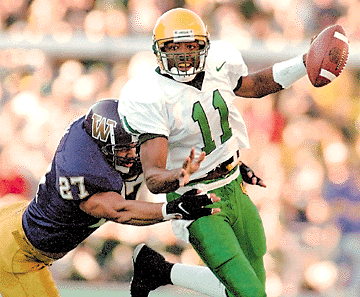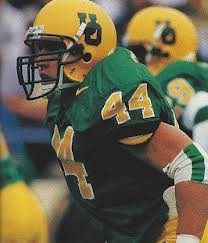The 1997 University of Oregon football season started off in rare form, with a nationwide Thursday night broadcast vs. the in-conference foe Arizona Wildcats, on September 4th. In a season that would see a wide variety of ups-and-downs and sub-plots, it began with fans wondering “what just happened?”, with Oregon RB Saladin McCullough returning the opening kickoff of the season for a touchdown before the television broadcast even began, Oregon was ahead 7-0 with only a few seconds off the clock.
On Fox Sports Northwest, fans not at the game were ripped off of seeing their beloved Ducks, as the Seattle Mariners game ran longer than expected and FSN did not switch over to the Oregon game immediately as it was set to kickoff.
It was a positive sign for the season to come, where experimentation and circumstance would lead to the team’s eventual overall success, but not without its growing pains, whereas years later a similar start presented an ominous foreshadow to a year of disappointment–2004; when Oregon returned the opening kickoff, but it was called back on a phantom penalty, leading to a loss to Indiana in the last season that Oregon didn’t make it to a bowl game…
Michael Klews remembers the surprising start to the season well, now a police officer but at the time a starting offensive tackle entering his junior year with the team. “To open the season that way was huge! Any time you return a kickoff for a touchdown, it’s probably one of the most exciting things because it’s probably the longest developing play that can happen on a football field. Everybody in the crowd was up and jumping around; so it certainly elevated our excitement. It played a key in the momentum, but wasn’t the game changer.”
The game would tell a lot about Oregon’s chances for success in their 1997 campaign. There were lots of gaps and voids that Oregon fans wondered might effect their season. Along the offensive line, Oregon faced the daunting task of replacing four of five starters. Gone were five stalwarts: four-year starting center Mark Gregg, NFL-bound left tackle Paul Wiggins, left guard Bob Baldwin, legendary right guard Tasi Malepeai, and reserve tackle Willy Rife.
But the biggest questionmark drawing all the headlines was one Duck fans will be acutely aware of following this summer’s competition between Marcus Mariota and Bryan Bennett–who would be the starting quarterback–Jason Maas, or Akili Smith?
Maas and Smith certainly had contrasting styles; Maas the drop-back passer with experience and pinpoint accuracy but able to run when needed, Smith the junior college-transfer deemed the most exciting player in the Pac-10 by national publications with his previously unseen rare combination of size and speed.
Fans were very eager to see who would be the starting quarterback for Oregon, following the very tight Akili Smith/Jason Maas quarterback battle all fall camp. Thanks to the run back by McCullough, they would have to wait until Oregon’s next possession to find out.
Oregon’s defense had struggled the previous year, and at first appeared unable to slow Arizona’s arsenal of running back Trung Canidate and All-Pac-10 receiver Dennis Northcutt. Arizona moved their way into the Oregon redzone, but on 1st and Goal Aquarterback Keith Smith fumbled on an option when hit by Oregon defensive end Caleb Smith. Linebacker Peter Sirmon recovered the ball and returned it 33 yards, only a miraculous hit by the speedy stud athlete Dennis Northcutt prevented a touchdown return, which would have further extended the fans’ wait to see which quarterback would start. Instead, finally Duck fans would get their answer…
Onto the field stepped junior college transfer quarterback Akili Smith. Maas had played well in relief duties the previous season and appeared the heir-apparent, but in fall camp it had been the physical specimen Smith who had out-shined him, similar to the Bennett-Mariota battle that came to define the expectations going into the 2012 season.
“It was hard adjusting between Akili (Smith) and Jason (Maas),” Klews remembers. “They were such different quarterbacks. One had happy feet (Akili) and one didn’t (Jason). As a line, you become comfortable with where you expect the QB to be; given we have our back to the quarterback. We have to believe the QB is going to be in a certain spot, and we’re blocking towards that spot. If you have two quarterbacks with different styles, they’re in different spots at any given moment–that was really difficult. But, I think our strength was that we could adjust to it, and we did adjust to it. It just reiterated our overall versatility as a line. We made game-time adjustments, and we made HUDDLE adjustments–which I don’t think “Zoomer” (Coach Neal Zoumboukos) knew.”
Smith had a rocky start, sacked for a loss of ten yards in his first NCAA play of his career, and Oregon had to punt. Arizona and Oregon would both be unsuccessful on their ensuing drives, going three-and-out.
While still raw and adjusting to division-1 game speed, Smith did flash the talents that pushed him ahead of Maas on the depth chart, and eventually made him the third overall draft pick in the NFL following the 1998 season.
On one play Smith scrambled to escape pressure, broke two tackles, and used his jets to gain 15 yards. It was the first of many jaw-dropping plays Smith would make as a Duck, a sign of things to come for the next two seasons, but the results would remain mixed in Smith’s first competition as the drive was foiled with an interception on a deep pass.
Following a shanked Arizona punt, Oregon drove the field on the feet of both McCullough and Smith, the patchwork offensive line showing its first signs of understanding. Capped off with a two-yard touchdown pass to tight end Blake Spence, for the first offensive touchdown of the year and Smith’s first TD of many to come, Oregon was rolling. A missed extra point left the tally at 13-0.
The rebuilt offensive line’s performance was a welcome sign, after a long summer of work to fill the large voids left behind by the graduating class.
“In camp, it helped to have so much time during fall camp to just get used to each other,” Michael Klews remembers. “Offensive line is not about being the best player, but the best unit. We want to bring out the five guys who work best together, not best individuals. Having time to prepare, all staying for summer, working hard together, getting to know each other’s strengths helped a lot. You develop a sense of ESP, knowing what they other guy is going to do.”
The scoring drive proved that all that hard work had paid off. For as much as the offense appeared to still be a work-in-progress, the signs were there that with time this team could be special.
“We were never allowed to become comfortable because of that competition between the two quarterbacks,” said Klews. “Comfort is a double-edge sword. It’s easy to become comfortable, but then you become complacent. If you’re always on guard and never really know, then you have to focus on your true assignment. You can draw it up on the board and know where the QB is supposed to be, but reality is that QB will likely end up in a different spot. It builds trust among the O-line to learn together, that goes back to that ESP thing, where you just know where everyone will be and what everyone will do.”
Whereas the offense was still trying to find its feet, the Oregon defense was proving as stingy as had been seen in years since the storied “Gang Green” defenses of 1994 and 1995. Led by do-everything middle linebacker Peter Sirmon, the group was as stout as ever, completely stymieing Arizona’s thwarted attack.
Since the Sirmon fumble recovery early in the first half, the Wildcats had done little. Sirmon continued to shut down the Cats, forcing another punt, and another shank setting up Oregon with good field position.
Before halftime, finally it was Jason Maas’ turn to take the reigns as well. Prior to the start of the game, Mike Bellotti (who had not named a starter) made it known that both quarterbacks had worked hard enough to start; meaning regardless of the starter, both Smith and Maas would see playing time that night.
Maas made the most of his chance in leading the team, but it would be Saladin McCullough throwing the ball to set up another scoring opportunity, with a trick play resulting in a 32-yard gain by wide receiver Patrick Johnson. The drive would stall at the goal line, but a 19-yard field goal by Joshua Smith extended Oregon’s lead, 16-0.
With the clock ticking down to halftime, Arizona did start to finally find some cracks in Oregon’s defense, mounting a drive on the legs of running back Trung Canidate. However on 4th down linebacker Ryan Klaasen slammed the door shut, sacking Arizona QB Keith Smith on 4th and 3, preserving Oregon’s halftime shutout.
Despite the 16-0 score, the stats in the first half were almost identical. Oregon’s offense was working hard, but stumbling trying to find consistency with new quarterbacks and offensive linemen, but Oregon’s defense was so dominant that it had setup plenty of scoring opportunities.
However a fortuitous call and some consistency would have Arizona storming back in the game. ON their second possession of the 2nd half, Arizona pushed into the redzone. What appeared to be a huge break for Oregon was nullified by a controversial call in the days before instant replays; Michael Fletcher recovering a fumble and returning it deep into Arizona territory, but the runner was ruled down; giving Arizona the ball back on fourth down. Arizona settled for a field goal, finally getting on the board, 16-3.
The remainder of the third quarter became a defensive stalemate, Akili Smith returning to lead the offense but finding none of the rhythm he had shown to lead Oregon to its sole offensive touchdown in the first half. Peter Sirmon was all over the field, sacking Keith Smith multiple times, as neither team could muster any more points in the third quarter.
It shaped up as an eerily similar contest to the 1994 epic Gang Green vs. Desert Swarm struggle, a defensive battle for the ages that ended in a hard-fought 10-9 Oregon victory.
Into the 4th quarter, a pivotal moment came with Oregon pinned deep in their own territory, Jason Maas back in the game with the coaches shuffling QBs trying to find any sense of offensive rhythm.
With Maas almost taken down for a safety, a penalty actually saved Oregon from handing all the momentum to the Wildcats, a holding call on right tackle Michael Klews. Beaten by his defender, but not about to allow him by, Klews was called on a holding penalty just outside the endzone that allowed Maas the room to scramble to avoid the safety, scrambling for a first down.
The penalty on Klews nullified the first down, but would only penalize half the distance to the goal, and give Oregon another chance instead of a safety. “It was a rollout pass to the right, and I pulled right,” Klews remembers. “I don’t know if I tripped over my feet, but the safety who came up beat me. I remember reaching out and grabbing this guy out of nowhere and getting him down. We often can get away with that, but not that time!”
Klews continues, “That’s actually what I remember most from the game, a good high school buddy (from Castro Valley, CA) came up to see that Thursday game–the first time I had seen him in years. It was so cool to have my friend come all that way to watch me play, but the thing I remember most is the holding call on me. I got chewed out terribly by (Coach Neal) Zoumboukos. Zoomer is the only guy I know who is 5 foot 1, 110 pounds soaking wet who can make an entire room of 300+ pound guys cry–all just because we disappointed him. Zoomer always set the standard higher, always leaving room for improvement, and we never wanted to disappoint him. Zoomer was like (Len) Casanova. Cas was the type who could make anyone want to do better. If Zoomer were to ask anyone to come paint his house, I know I would be there in a heartbeat. I don’t think he really understood what an influence he had on my life. I’m sure I’m not unique in that fashion.”
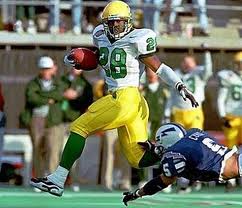
Saladin McCullough set multiple records at Oregon, but had a tough time finding running room vs. Arizona
Unable to convert, but saved from a safety, Oregon was forced to punt again. Like most of the second half, Arizona had good field position around midfield, but Sirmon and company remained strong for the Ducks. Yet again, Sirmon had a huge sack on first down for a loss of ten, his 11th tackle of the game and fifth for loss.
True Freshman Rashad Bauman was playing in his first game at Autzen, proving his worthiness by making a shoe-string tackle on Northcutt to save a huge play for Arizona. Senior Jaiya Figueras would prevent a first down from a quarterback run, and a fourth down pass fell incomplete as the fourth quarter wound down, again the Oregon defense holding strong.
Each team would punt ten times over the course of the game, a field position duel defined by one offense trying to find their identity and one defense too proud to give an inch.
Down two scores with only two minutes left in the 4th quarter, Arizona would get the ball back. Pounding out first downs inch by bloody inch, they willed themselves down the field in a drive that consumed almost the entire clock, but found the endzone with 14 seconds remaining, bringing the score to 16-9 (the extra point was missed).
Facing an onside kick, Arizona got a bounce they wanted, with Arizona cornerback Chris McAllister recovering at the 46 to set up a couple shots at the endzone, but the referees incorrectly ruled that McAllister had touched the ball before it traveled 10 yards. Possession was given to Oregon, the game effectively over. Arizona had brought it to within striking distance, they had managed to somehow crack the impenetrable (on that night) Oregon defense, but it would not be enough. Oregon kneeled on the ball to end the game.
It had been an ugly affair from an offensive perspective, lacking in cohesion but with no shortage of effort given by both teams, each defense proving their merit. Peter Sirmon earned Pac-10 player of the week honors for his efforts, while fans could celebrate the start of the year with a conference victory.
Both teams would follower eerily similar paths. Arizona would stumble early but rebound in the second half of the season for a 6-5 regular season record and a trip to the Insight.com Bowl, a 20-14 victory over New Mexico. The following year would be their greatest achievement, finishing 12-1 on the year and 4th in the polls.
Oregon meanwhile would continue their bi-polar offense, at times finding momentum with Smith or Maas at the helm, but neither quarterback truly separating from the other all year. The offensive line continued to learn on the job, while the defense led by Sirmon performed admirably keeping the games close. Getting started on the right foot, with the 16-9 victory over Arizona to begin the year, would prove an invaluable experience.
“It was our ‘never say die’ attitude, and ‘never over until its over’ type of mentality that we strived for and worked hard to achieve,” Klews recalls. “I don’t think there was necessarily one play that made the huge difference in that game, and I firmly believe it’s never one play. Any time your opponent comes back on you, there’s that ‘oh no’ moment, but then you go ‘okay, my turn now.’ We made the most of our chances on offense, and the defense made it stick when needed most. That game gave us confidence, it validated what we knew about ourselves already–that we were contenders, we were capable of competing.
Oregon’s year, like Arizona, would be up and down, finishing 6-5. The high point during the regular season proved that this Duck team was growing, going up to Seattle to face the vaunted Washington Huskies and emerging with Oregon’s first victory at Husky Stadium since 1980. It was highlighted by a late touchdown pass from Akili Smith to Patrick Johnson diving in the endzone, the offensive weapons for the Ducks starting to showcase their talents behind the patchwork offensive line that was getting better by the day.
A trip to the Las Vegas Bowl to close out the year facing Air Force showed that all the efforts of the 1997 season were starting to pay off. On the first play of the game Akili Smith, now starting to emerge as the starter over Maas, hit Patrick Johnson for a long touchdown. The next time Oregon touched the ball, Saladin McCullough broke free for a long touchdown run. The defense again showed the dominance they had displayed that opening night against Arizona, and the Ducks cruised to a 41-13 win.
That momentum, again just like with Arizona, would carry over in to the 1998 season in epic fashion. Considered the first season that Oregon was a legitimate contender in the national title hunt, the Ducks emerged as an unstoppable offensive juggernaut in 1998, Akili Smith in Heisman Trophy form at the helm and new Juco transfer RB Reuben Droughns taking over for the departed McCullough leading the nation in rushing. Injuries would derail Oregon’s season, but not until after leaving their mark in the record books, led by a dominating offensive line with Klews leading the way, having learned through all of 1997’s hardships how to compete at the top level in 1998. It will forever remain a year of what-ifs for Oregon fans and players alike, a team that if healthy was capable of competing among the elite in the nation, thanks to the lessons of the previous year.
“The lessons you get from playing the silly game, it’s amazing the life lessons you get out of it,” said Michael Klews, reflecting on his days as a Duck. “The concept of hard work, self discipline; the concept of team, and how many people think they’re a team but don’t understand what a team really is. Some only think of a team as if they’re the leader or the shining star. But, team is a group of individuals fighting for the same goal; and sometimes, your part is not as the shining star, but you have to be that support person. You have to be willing to make that self sacrifice. That is what a team is, not me being the superstar all the time, but what is best for the group as a whole.”
Oregon came into the 1997 season with questions—holes to fill and questions to address. They left Autzen Stadium that Thursday night victors, but knowing that it was still a work in progress, that more nights like that in 1997 would help develop the team into bigger and better things, and through it all grow as individuals and as a team. By the end of the year they emerged with clear starters decided, and an aura of confidence and swagger a sign of great things to come.
These are articles where the writer left and for some reason did not want his/her name on it any longer or went sideways of our rules–so we assigned it to “staff.” We are grateful to all the writers who contributed to the site through these articles.

